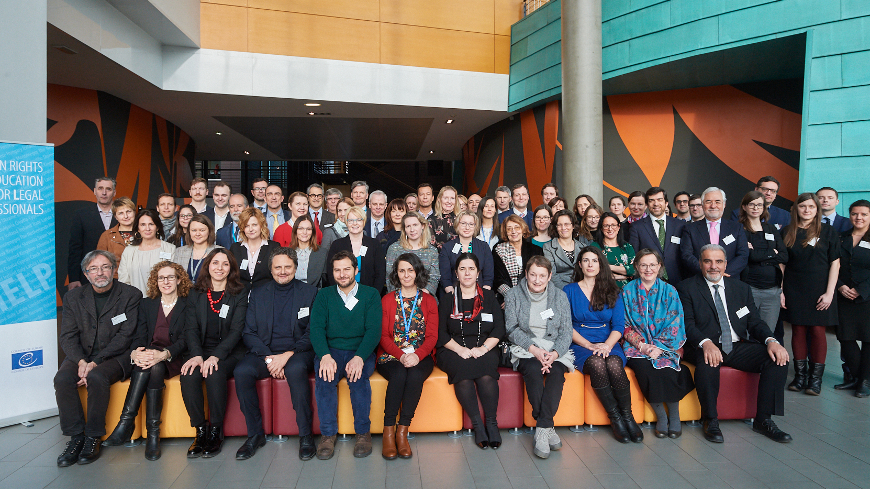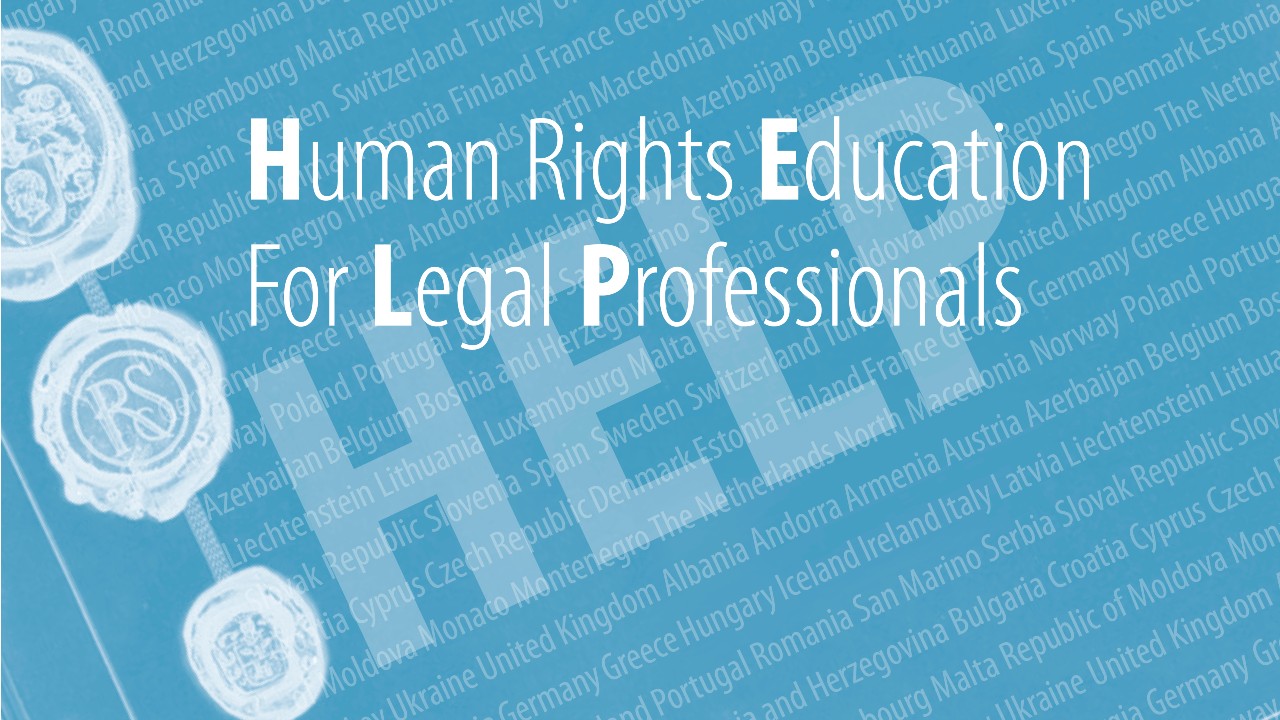Representatives of EU national training institutions for judges, prosecutors and lawyers and Council of Europe Human Rights Education for Legal Professionals (HELP) Programme international partners met in Strasbourg on 31 January-1 February 2019.
The "HELP in the EU" Network Conference is the main gathering of the HELP Network members and partners from the EU. It was organised under the EU-Council of Europe “HELP in the EU” Project, funded by the EU and the Council of Europe and implemented by the Council of Europe through the HELP Programme.
The Conference provided a forum for discussion to enhance human rights training results and to improve co-operation among all members and partners in the EU, focusing on:
- highlighting the impact of human rights training in delivering justice and the role of EU national training institutions for legal professionals in this endeavour
- presenting the developments in the “HELP in the EU” Project and the newly developed HELP courses
- developing strategies for fostering effective human rights training at EU level
- mapping priorities and discussing future opportunities for implementing HELP courses in EU MS, at national and cross-border level.
The newly developed HELP courses under the "HELP in the EU" project were also presented to the participants:
- Family Law and Human Rights
- Procedural Safeguards in Criminal Proceedings and Victims’ Rights
- Gathering and Use of Evidence in Counter-terrorism Cases
Christophe Poirel, Director of Human Rights of the Council of Europe, opened the Conference highlighting that the "HELP in the EU" Network is part of a larger network composed of national training institutions and Bar associations of 47 Member States of the Council of Europe, a unique platform in its nature, bringing at the same table representatives from all the three main legal professions: judges, prosecutors and lawyers. He also highlighted that HELP courses reflect the Council of Europe work in tackling the persistent challenges affecting our continent. Moreover, they combine the EU and the Council of Europe law and case law, and help judges, prosecutors and lawyers to apply in a practical and effective way both systems. The HELP catalogue of courses has over 30 thematic courses and more than 220 translations and adaptations available.
He underlined the backing of HELP’s key allies, particularly, the European Union as a strong political and financial partner, as well as the partners from the EU MS and at international level (such as the European Judicial Training Network (EJTN), the Council of Bar and Law Societies in Europe (CCBE)). He concluded by reiterating the importance of the message sent through the Council of Europe’s motto for the 70th anniversary, namely to stand for ‘our rights, our freedoms, our Europe’.
Per Ibold, from the EU Delegation to the Council of Europe, emphasised the importance of training within the EU Justice programme, under which HELP interventions in the EU are funded and highlighted the importance of cooperation between national and European levels (EU and Council of Europe) whereby cross-border and cross-professional training is meant to stimulate mutual trust within Europe. On the European Judicial training policy, while quantitative results have been reached, quality deserves further attention. He also announced the upcoming call for proposals under the Justice Programme.
Eva Pastrana, Head of the HELP Unit, provided an overview of the HELP programme and Ana-Maria Telbis, Coordinator of the EU-Council of Europe project “HELP in the EU” introduced the current and upcoming courses under this project, as well as an update on figures of newly certified HELP tutors and new launches of HELP courses in the past year. Impressively, 17000 users come from EU MS, making more than half of the HELP e-learning platform users. The participants were also introduced to the main stages of the HELP methodology, from course development to course implementation and evaluation.
A practical presentation of recent developments and case law on family law and human rights was delivered by Maria-Andriani Kostopoulou, HELP Info Point for Greece. She provided good examples of cases from different countries involving issues of relationships between couples (recognition, dissolution and inheritance-related issues) and parentage (reproductive rights, filiation and parental authority and access rights), most of them also included in the HELP course on Family Law and Human Rights which will be accessible in the HELP online platform by mid February 2019.
The Conference continued on the second day with two examples from national training institutions which successfully integrated HELP courses in their regular training curricula. Julen Fernandez Conte brilliantly illustrated Spain’s best practices implementing HELP courses and its methodology, based on the fruitful alliance of the Spanish National Bar with the Spanish Judicial School with 7 courses already available in Spanish (soon to be 11). He explained how the Spanish National and Regional Bars conduct a careful selection of participants for courses through assessment of qualifications, expertise and capacity for dissemination of the courses using also national platforms and technology.
Rafael Bustos, from the Spanish Judicial School (SJS) emphasised the importance of cooperation for cross-professional training and integration of courses in the regular curricula proposed to legal professionals. He underlined the importance of training in-house SJS trainers in the HELP methodology and how Spain is allocating own budgetary resources for this (upcoming Training of Trainers (ToT) in Madrid) in order to launch and incorporate HELP courses into national curricula (of the SJS but also the Centre of Judicial Studies for prosecutors and the Bar).
Diogo Ravara presented the experience of the Portuguese Centre for Judicial Studies, which includes cross-border ToT with other EU countries. He touched upon the issue of evaluation of the impact of training, also evidenced by the fact that there has been a change on the mind of trainers, who now have the reflex of using HELP courses.
On the latter issue, speakers mentioned that a good way to evaluate training impact is through the increased number of past participants who enrol themselves in additional HELP courses, as well as through the increased quality standard of cases (better prepared cases, more professional advice from lawyers in a country).
Szymon Janczarek from the Execution of Judgements Department of the Council of Europe spoke about execution of judgements, noting that implementation of measures can be very difficult, especially general measures meant to prevent similar violations of the Convention from being committed again (i.e. introduction of effective remedies at national level). The Committee of Ministers supervises de execution of judgements and puts peer pressure on states. He also highlighted the importance of the role of HELP training within the execution of judgements, as states could use HELP courses to address the measures involving specialised training on specific topics.
Janeta Hanganu, from the Office of the Special Representative of the Secretary General on migration and refugees (SRSG) explained that, although the right to asylum is not contained in the European Convention on Human Rights (the Convention), refugees, migrants and asylum-seekers enjoy important human rights protections under the Convention. The SRSG Office was established in 2016 to gather information on how the fundamental rights of migrants and refugees are protected on the ground in the member States, and to develop proposals for action at national and European level. It has been very active and has a particular focus on refugee and migrant children. The SRSG Office successfully collaborated in developing the HELP course on Refugee and Migrant Children as part of the Action Plan on Protecting Refugee and Migrant Children in Europe (2017-2019).
Stefano Valenti, from the Secretariat of the European Commission against Racism and Intolerance (ECRI) made a presentation on the work of ECRI, composed of independent experts, which produces monitoring reports and guidelines for governments to help them to tackle different issues related to discrimination. He highlighted some of the main challenges, such as the lack of litigation in the area of discrimination, problems in prosecuting hate crimes (narrow definition of hate crime in law, the gathering of data and monitoring of racist/homophobic/transphobic incidents).
Three new courses developed under the two EU funded projects, "HELP in the EU" and "HELP Radicalisation Prevention" were presented in detail:
- Family Law and Human Rights by Maria-Andriani-Kostopoulou, course coordinator
- Procedural Safeguards in Criminal Proceedings and Victims’ Rights by Claire Dubois and Kirill Belogubets, lawyers from the European Court of Human Rights involved in the development of the course and
- Radicalisation Prevention, including the module on Gathering and Use of Evidence in Counter Terrorism Cases, by Eva Massa, coordinator of the “HELP Radicalisation Prevention” EU-Council of Europe Project.
They gave their perspective on the importance of thematic training for legal professionals on these issues.
Ana Medarska from the HELP Programme also presented the newest courses published on the HELP e-learning platform and the upcoming course under development with the European Committee for the Prevention of Torture and Inhuman or Degrading Treatment or Punishment (CPT).
The conference ended with an open floor session mapping priorities for future HELP activities in EU countries. The future activities planned under the “HELP in the EU” EU-Council of Europe project will take into consideration the expressions of interest of various national training institutions in launching courses in cross-border format and sharing best practices.
Presentation of the HELP Programme by Eva Pastrana, Head of HELP Unit, Council of Europe
Presentation of the "HELP in the EU" project by Ana-Maria Telbis, "HELP in the EU" project manager, Council of Europe





